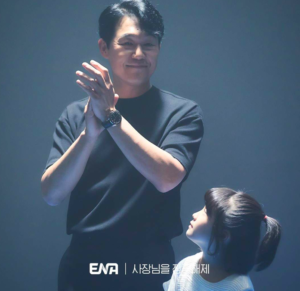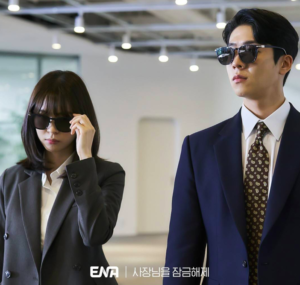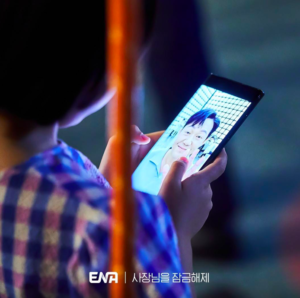
One day you’re a struggling actor, the next day you’re stumbling across a talking smartphone in the woods that asks you to take over as the new CEO of a successful tech company. What do you do?
If you’re Park In-seong (Chae Jong-hyeop), you take the deal and assemble a team that consists of you, the sentient smartphone, your secretary, and her loan shark in order to solve how and why the former CEO is now trapped inside a smartphone. Unlock My Boss, based on a webtoon of the same name, has a creative premise but a simple message — that the good will ultimately prevail.
Kim Seon-joo (Park Sung-woong), the CEO of tech company Silver Lining, finds himself trapped in a smartphone, unable to remember how he ended up there or locate his actual body. Cue the underqualified In-seong, who is looking for a job (and money), who takes the deal hat Seon-joo offers him: take over as CEO of Silver Lining as Seon-joo feeds him everything he needs to know about running the company, while solving the case of what happened to him in secret. Jung Se-yeon (Seo Eun-soo), Seon-joo’s former secretary and now In-seong’s, is let on to the secret, and eventually her loan shark, Ma-pi (Kim Sung-oh), joins the crew as the bodyguard.
This review contains spoilers.
Unlock My Boss makes the most of its premise to explore the relationship between technology and humans, and what it means to be living. The drama humanizes Seon-ju (in his phone form), while playing up that he is still a physical object. Is Seon-just part of the technology itself, or is he just inside the smartphone?
Seon-ju certainly utilizes the various functions of a smartphone. For example, he has a voice that he can use to talk to In-seong and Se-yeon, similar to how Apple devices have Siri. When he cannot communicate orally with them, he pulls up the notes app so that they can read his directions. On a more comical note, In-seong accidently drops Seon-ju in the toilet, and In-seong panics because Seon-ju becomes unconscious (the phone does not turn on). Such instances emphasize the very physical consequences of Seon-ju being a smartphone.
However, the scene following the toilet scene suggests that In-seong views Seon-ju not as a smartphone but as a human being. In an exaggerated, imagined sequence, In-seong dashes into an emergency room of a hospital and begs for hospital staff to resuscitate Seon-ju. The phone is placed on a hospital bed and wheeled away.

Like In-seong, the audience is invited to envision the phone as an embodiment of Seon-ju. Indeed, many of Seon-ju’s interactions with other characters highlight his human-like tendencies. At one point, a shaman hired by In-seong’s mother performs an exorcism on Seon-ju, believing that the phone is haunted by a ghost set on ruining In-seong’s life.
In another scene, Kim Min-ah (Ki So-yu), Seon-ju’s young daughter, puts Seon-ju in a phone case she made herself, calling it his new outfit. Such a statement personifies the phone by equating the case to clothing items and that Seon-ju is somehow becoming more fashionable depending on the case (the outfit) that he dons. There are small details that suggest the same. In group meetings with In-seong and Se-yeon, Seon-ju swivels in the phone stand he is in so that the screen faces the person speaking. Much like people would turn to the person they speak to, Seon-ju does so that he is “facing” whoever is speaking.
Whether Seon-ju is a part of the smartphone or is merely inhabiting it, at the end of the day, it does not matter; the phone is still ultimately a piece of technology that cannot replace a real human being. The final twist to the show reveals that Seon-ju that is in/a part of the phone is not actually him. Instead, it’s the latest version of an AI assistant that Seon-ju was developing in secret prior to his disappearance.
It is so advanced that it can speak exactly like him, and it even develops its own thoughts and feelings by learning from In-seong. However, the Seon-ju AI is a piece of technology, which is neither good nor bad. Those terms are determined by the way that people use it. In this case, the AI has served Seon-ju’s purpose of finding out what happened to him, though in the hands of the enemy it can just as easily be exploited for profit while endangering people.
Though the show’s premise is based on treating a piece of technology as a human, Unlock My Boss ultimately suggests that kindness and empathy will ultimately determine success, not the ability to innovate. From the very beginning of the drama, In-seong already has such values, though he would not be considered a successful person by many others. He is not successful in pursuing his dreams, lacks a full-time job, has no career prospects, and he decides to give up on pursuing acting and move back home.

However, he stands by his morals and never backs down from them. For example, he refuses to be a bystander when a Silver Lining employee is rude to the janitor. In another, he chooses to save a baby in a stroller from tumbling down the stairs instead of chasing a potential suspect in Seon-ju’s disappearance. Though his choices are not initially welcomed by the others, Seon-ju, Se-yeon, and even Ma-pi eventually learn from In-seong’s dedication to helping others. His kindness is eventually rewarded, and In-seong gets the happiest ending as he is able to become a successful actor. Such an ending suggests that those who are kind to others will one day be compensated for their good deeds.
Unlock My Boss puts a creative spin on a universal message to do good by others. The idea of a human contained in a smartphone does ignite unique questions about technology and its ability to truly capture the human soul, though ultimately the drama’s message is very simple and universal. Even for audiences not looking to ponder the complexities of the relationship between humans and technology, Unlock My Boss is a quick, satisfying watch for those wanting to see the bad be defeated and the good prevail.
(YouTube. Images via ENA.)


